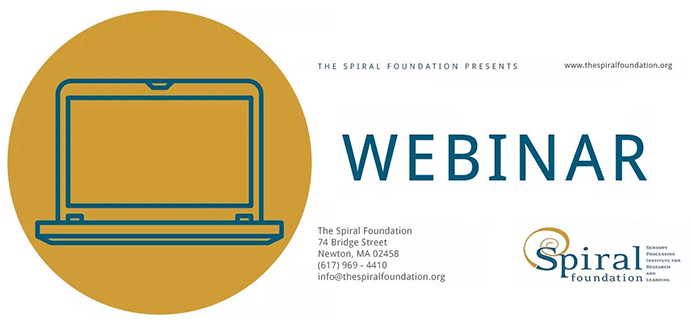Presented by: Monique Redmond, OTR/L MMG
originally recorded February 13, 2020
Webinars are video presentations and include the recorded PowerPoint and lecture and a .pdf copy of the PowerPoint notes.
Description: Working with clients that are transitioning into adulthood can be challenging, especially those clients with sensory processing challenges. Whether directly or indirectly involved with the actual transition process, it is important for clinicians working with these clients to have an understanding of the process involved in transitioning to adulthood as well as be able to identify how sensory challenges may influence this process. This webinar will review Transition law, Transition as part of the IEP process (assessment, goal writing, and treatment planning), Best Practices for OT in addressing Transition, and an introduction to Transition I and II (curricula for middle school life skill and self-determination groups). The emphasis of the presentation will be on using interdisciplinary groups, employing self-determination & self-regulation skills, mastering skills beyond the school day, and training staff in encouraging skill independence. Specific adaptations for those with sensory challenges will also be discussed.
Learning Objectives
By the end of this LiveTalk listeners will be able to:
- Describe the Transition Federal and State Law and its foundation principals in IDEA.
- Identify Transition and Self Determination assessments and forms and their role in treatment and IEP goal planning. (goals supported by Goal Book format)
- Identify methods of OT intervention applicable in the classroom and in interdisciplinary groups specific to those with sensory modulation and regulation concerns.
- Describe functional activities and the Transition I and Transition II curriculum addressing Transitions skills for middle and high school students
Course Level: Intermediate. There are no prerequisites for this course.
Suitable For: Occupational Therapists, OT Assistants
AOTA
Domain: Client Factors
Process: Outcomes
Contact Hours: This course is worth 1.5 contact hour or 0.15 AOTA CEUs.
Completion Requirements:To receive contact hours for this course you must listen to the recorded webinar in its entirety and complete the accompanying assessment.
About the Speakers: Monique Redmond has been an occupational therapist at Boston Public Schools for 12 years, having over 20 years of school system experience and degrees in occupational therapy and non-profit/state management. With a belief in the positive influence of self-regulation and self-determination she has trained in Transition law and theory, NDT theory, SIPT theory, and home accessibility. She recently developed year-long Transition and Self Advocacy Curriculums for middle school students with her colleague Jane Cawley, OTR. She has presented on Transition law and transition curriculum for Boston Public Schools, at community clinics and at DESE conferences. Having practiced in a variety of adult and child settings, she has also provided a day long sensory integration workshops for school systems, developed and provided a transfer training program for CNA’s & Health Assistants, and developed and implemented a home safety evaluation program for the University of Virginia Medical Center. She is currently facilitating the Entrance and Exit Cohort tasked to develop Entrance and Exit Guidelines for Related Service at Boston Public Schools.
ADA/Section 504: If you require special accommodations, please contact the Spiral Foundation at admin@thespiralfoundation.org or (617) 969-4410 ext. 231.
Continuing Education:

Occupational Therapy Practitioners/ Occupational Therapy Assistants: The Spiral Foundation is an Approved Provider of Continuing Education for occupational therapists and occupational therapy assistants by the American Occupational Therapy Association. The assignment of AOTA CEUs does not imply endorsement of specific course content, products, or clinical procedures by AOTA..

